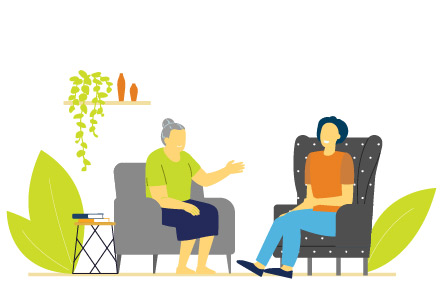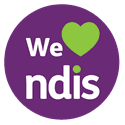What is a psychosocial disability?
When mental health conditions are severe and lifelong, a disability may arise. Not all people experiencing mental ill-health will have a psychosocial disability, but for people who do, there are impacts on their prospect of recovery.
For example, a NDIS participant with a psychosocial disability may have schizophrenia, and they will live with the condition for the rest of their lives. This participant will be unable to participate in regular, paid employment due to the symptoms of their condition and they will require ongoing medical intervention to manage it. This participant may also need assistance with daily living activities or engaging with their community.
People with a psychosocial disability may live with any number of mental health conditions, such as borderline personality disorder (BPD), schizophrenia, schizoaffective disorder, post-traumatic stress disorder (PTSD), acquired brain injury (ABI), major anxiety, and major depression.
Most mental health conditions occur alongside other, closely related conditions, like depression and anxiety, PTSD and substance use disorder, or another disability.
How can we help?
Our professional Mental Health Area Coordinator oversees and coordinates support services for participants with mental health challenges, such as participants with a psychosocial disability.
The support services we offer for participants with psychosocial disability are


Assistance with daily life or everyday needs such as household cleaning


Assistance with social and community participation where one of our friendly support workers will help you to get out and about in your community


Development and training to increase your skills so you can participate in community, social and recreational activities


Assistance with connecting to allied mental health professionals such as counsellors, psychologists, or psychiatrists


In-home respite


Speak to us today about how we can best support you
Psychosocial disability and stigma
Due to its basis in mental health, psychosocial disability is one of the most heavily stigmatised disability types. The stigma against people living with a psychosocial disability is compounded due to mental health stereotyping, along with misconceptions about mental illness, as well as the stigma around having a disability of any kind. This compounded stigma, at the individual and systemic levels, stops people from seeking help for their condition.
That’s why in 2021, the NDIA developed and published the Psychosocial Disability Recovery-Oriented Framework (Recovery Framework). This framework was developed to guide the NDIS in improving its responsiveness to psychosocial disability.
At Helping Solutions, we also acknowledge the stigma and discrimination faced by people with psychosocial disability within the healthcare system and we’re committed to addressing it by spreading awareness. You can read more about this in our Diversity & Inclusion Statement.
FAQ
What’s the process for receiving Mental Health supports from Helping Solutions?
Fill out our referral form and select ‘Mental Health’, and our team will be in touch to discussion your individual needs and explore options.
How will my support plan be tailored to my mental health goals?
We will work with you to identify what is most important and provide supports that meet your individual goals.
What support can you offer during a mental health crisis?
Since no two participants are the same, our key supports include Respite Care, Community Participation and Daily Living services, offering different aspects of support and care depending on your diagnosis.
Can my family, carers, or other professionals collaborate with you on my support plan?
Yes, our process ensures that with your consent, key people in your life have the opportunity to be involved in your care plan.
Am I eligible for Mental Health Supports?
Having an NDIS Plan is a required pre-requisite to accessing Helping Solutions supports and services, including Mental Health Supports.
What if I’m already receiving supports from Helping Solutions or other providers?
You can still apply for Mental Health supports, but we encourage you to discuss this with your Support Coordinator or a trusted family member to ensure you’re maximising the supports in your plan.
How can I provide feedback or raise concerns about my care?
Feedback is very important to us, and we want our participants to feel that they can raise any concerns at any time. If you have feedback or concerns to share, please complete our Feedback and Complaints Form.

